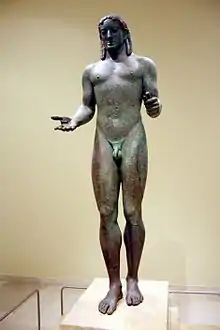
The Piraeus Apollo is an ancient Greek bronze sculpture in the archaic style from the 2nd or 1st century BC [1] (or possibly an earlier work dating 4th or 3rd century BC[2]), exhibited now at the Archaeological Museum of Piraeus, Athens.
Overview
._Late_6th_-_early_5th_cent._B.C.jpg.webp)
The sculpture was discovered in the ancient harbor of Piraeus in July 1959, along with the Piraeus Athena and Piraeus Artemis[3]
The Piraeus Apollo was long thought to be a product of the late archaic period (530–480 BC), and would have been among the few bronzes from that time period to have survived. Newer research view it as a archaizing (mimicking the archaic tradition) sculpture of the Hellenic period. This is due to its mixing of features from different time periods and its stance, which contrasts other archaic kouroi, such as the Kroisos Kouros, as pointed out by Olga Palagia.[1][2]
See also
References
- 1 2 Fuchs, Michaela (1999). In hoc etiam genere Graeciae nihil cedamus. Verlag Philipp von Zabern. pp. 18–21. ISBN 3-8053-2519-3.
- 1 2 Palagia, Olga (2016). A. Giumlia-Mair; C.C. Mattusch (eds.). Towards a publication of the Piraeus bronzes: the Apollo. Proceedings of the XVIIth International Congress on Ancient Bronzes, Izmir. pp. 237–244.
- ↑ Mattusch, Carol C. (1996). Classical bronzes : the art and craft of Greek and Roman statuary. Ithaca, NY: Cornell University Press. p. 129. ISBN 9780801431821.
Further reading
- Dafas, K. A., 2019. Greek Large-Scale Bronze Statuary: The Late Archaic and Classical Periods, Institute of Classical Studies, School of Advanced Study, University of London, Bulletin of the Institute of Classical Studies, Monograph, BICS Supplement 138 (London), pp. 97–116, pls 82–126.
External links
- Piraeus Apollo (Sculpture), Tufts University